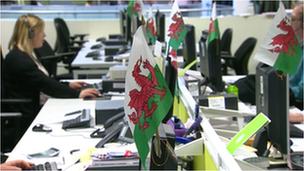Concern as Leighton Andrews rejects Welsh language plan
- Published

The standards will place binding duties on some private companies if people want to use Welsh
Campaigners have accused the Welsh government of caving in to pressure over a set of rules which would require services to be available in Welsh.
Proposed standards on when public and some private bodies should use the Welsh language were rejected for being too complicated by ministers.
The proposals were made by the Welsh Language Commissioner.
A former chief executive of the Welsh Language Board has questioned the need for the commissioner's role.
The Welsh government will propose a new set of standards and hold a statutory consultation with the public sector.
But campaigners and Plaid Cymru fear it will lead to delays.
Cymdeithas yr Iaith Gymraeg (The Welsh Language Society) described the decision as "bad news", saying the proposals and consultation by the Welsh Language Commissioner was thorough.
It said: "Naturally, it leads one to the conclusion that the government has decided that the interests of organisations and the profit of large companies like BT, British Gas and Arriva, are more important than the Welsh language."
But Leighton Andrews, the Welsh language minister, said on Monday that the proposals would not provide Welsh speakers with clear rights and many were unreasonable.
'Make a difference'
The standards place binding duties on the public sector and some private companies, such as phone and water firms, so people can use Welsh while receiving services.
They were the centrepiece of the Welsh Language Measure which was designed to strengthen the language when it was passed by the Welsh assembly in 2011.
Plaid Cymru Welsh language spokesperson Simon Thomas said: "The government and the language commissioner seem to be looking at alternative ends of the telescope and this suggests that we may face many more months of delay.
"We need an explanation about what went wrong and we must move quickly to achieve the standards. It's surprising that we are in this dilemma."
The commissioner, Meri Huws, published 37 draft standards in November after holding a non-statutory consultation over the summer.
John Walter Jones, former chief executive of the Welsh Language Board, said more supporters like sports personalities were needed rather than laws.
But Mr Andrews found some were contradictory and many appeared to be "unreasonable or disproportionate".
He told BBC Wales: "It wasn't about utility companies or any other group, it was question of standards that would be reasonable and could be held to be reasonable in court, whether they were applying to private companies, the public sector or indeed the third sector."
Responding to his decision, Ms Huws said: "The minister's officials and my officials will now work together in order to develop a set of standards which will ensure that the Welsh language is treated no less favourably than the English language in Wales.
"I welcome the minister's commitment to work towards the target of imposing standards before the end of 2014, and making them specifically applicable to bodies, as well as his desire to work with my office to realise this."
The 2011 measure wound up the former Welsh Language Board and created the office of commissioner.
Ms Huws, the first commissioner, was previously chair of the board.
John Walter Jones, chief executive of the Welsh Language Board until 2003, questioned the need for the role of language commissioner.
He told BBC Radio Wales the campaign needed more supporters like Welsh sports personalities George North and Becky James to encourage use of the language rather than laws.
"It's people like them that we need on board, not necessarily Welsh speakers. You should assume their support," he said.
"What we want to garner is the support of the non Welsh speaker and I don't think that by going down the route of legislation and the 'thou shalt' approach are we going to get them on board."
- Published25 February 2013
- Published30 January 2013
- Published17 May 2012
- Published2 April 2012